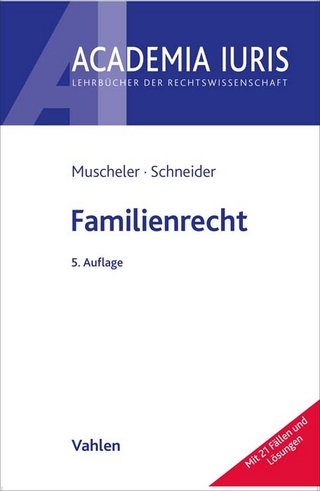
European Human Rights and Family Law
Seiten
2010
Hart Publishing (Verlag)
978-1-84113-175-7 (ISBN)
Hart Publishing (Verlag)
978-1-84113-175-7 (ISBN)
This book examines the potential impact of human rights in the way the law interacts with families. Traditionally family law has been dominated by consequentialist/utilitarian themes. The most notable example of this occurs in the law relating to children and the employment of the "welfare principle". This requires the court to focus on the welfare of the child as the paramount consideration. Hitherto the courts and, to a certain extent, family law academics, have firmly rejected the use of the language of rights, preferring the discretion and child-centred focus of welfare. However, the incorporation of the European Convention on Human Rights via the Human Rights Act now requires family law to deal more clearly with the competing rights that family members can hold. In addition, it is clear that, to date, the courts have largely ignored or minimised the different demands that the HRA imposes on the judiciary and, in particular, judicial reasoning. This book challenges that view and suggests ways in which the family courts may improve their reasoning in this field.
No longer can cases be dealt with on the basis of a simple utilitarian calculation of what is in the best interests of the child and other family members - greater transparency is required. The book clarifies the different rights that family members can hold and, in particular, identifies ways in which it may be possible to deal with the clash of rights between family members that will inevitably occur. Whether this requires an abandonment of the utilitarian nature of family law, or a reworking of it, is a theme that runs throughout the book.
No longer can cases be dealt with on the basis of a simple utilitarian calculation of what is in the best interests of the child and other family members - greater transparency is required. The book clarifies the different rights that family members can hold and, in particular, identifies ways in which it may be possible to deal with the clash of rights between family members that will inevitably occur. Whether this requires an abandonment of the utilitarian nature of family law, or a reworking of it, is a theme that runs throughout the book.
Shazia Choudhry is a Senior Lecturer in Law at Queen Mary College, University of London Jonathan Herring is a Professor of Law at Oxford University and a Fellow of Exeter College.
Chapter 1: An introduction to the ECHR Chapter 2: The concepts of rights and welfare Chapter 3: Parenthood and parental rights Chapter 4: Children's rights Chapter 5: Disputes over the child's upbringing Chapter 6: The private ordering of family disputes Chapter 7: Child Protection Chapter 8: Adoption Chapter 9: Domestic Violence Chapter 10: Marriage, Cohabitation and Civil Partnerships Chapter 11: Property Disputes between separating couples
| Erscheint lt. Verlag | 27.4.2010 |
|---|---|
| Verlagsort | Oxford |
| Sprache | englisch |
| Maße | 156 x 234 mm |
| Themenwelt | Recht / Steuern ► EU / Internationales Recht |
| Recht / Steuern ► Öffentliches Recht | |
| Recht / Steuern ► Privatrecht / Bürgerliches Recht ► Familienrecht | |
| ISBN-10 | 1-84113-175-X / 184113175X |
| ISBN-13 | 978-1-84113-175-7 / 9781841131757 |
| Zustand | Neuware |
| Haben Sie eine Frage zum Produkt? |
Mehr entdecken
aus dem Bereich
aus dem Bereich
Ehe, Scheidung, Unterhalt, Versorgungsausgleich, Internationales …
Buch | Softcover (2024)
dtv Verlagsgesellschaft
CHF 26,45


